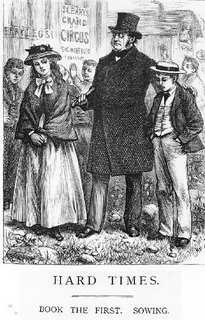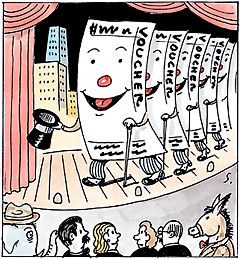It has shaken every teacher in every classroom, and when the No Child Left Behind law comes up for renewal next year, it faces a political battle that could last until after the 2008 election.
"We did a survey of Washington insiders and it is almost unanimous that it won't happen until 2009, regardless of what all the politicians are saying," said Michael Petrilli, an education analyst with the Thomas B. Fordham Foundation, who worked in the Education Department when the law passed.
President Bush touts No Child Left Behind as a "significant education accomplishment" and says its reauthorization next year is "an important part" of his legislative agenda.
Education Secretary Margaret Spellings has compared the five-year-old law to the old advertising slogan for Ivory Soap - 99 percent pure.
Yet most education analysts scoff at such high praise and say political forces are arrayed against it.
Conservatives are angry that the law intruded into state education responsibilities, Petrilli said. Liberals say the government never spent enough to pay for the law's requirements. Bush no longer has the political capital to overcome opposition, and the law soon will become part of the presidential campaign.
Teachers' unions, a major constituency of the Democratic Party that will control Congress, want significant changes.
"Children do not learn at the same rate, at the same speed, at the same time, but this law expects that to occur," said Reg Weaver, president of the National Education Association, the nation's largest teacher union. "Our folks just cannot continue to be under this gun."
That doesn't mean the law dies if Congress fails to renew it in 2007. It will continue as it stands now until Congress finds the political will to reauthorize it with changes.
"Important parts of it are not working well," Petrilli said.
Some critics say the law's requirement that every child in America be proficient in math and reading by 2014 is unrealistic. Others say states are avoiding reform by making the tests too easy. Still others say it is impossible to have challenging tests and still have 100 percent proficiency.
The law, which is aimed mostly at grades three through eight, requires that every student group - minorities, English-language learners, the disabled, the economically deprived - advances or the entire school is cited for failing to made adequate yearly progress.
"The nation can't walk away from the mission of NCLB," said Amy Wilkins of the Education Trust, a think tank that supports educational standards. "This cannot be about watering it down."
Education philanthropists, led by the Bill and Melinda Gates Foundation, created a commission to review education reform options. The commission - chaired by former Health and Human Services Secretary Tommy Thompson, a Republican, and former Georgia Gov. Roy Barnes, a Democrat - is slated to report in February.
"Some of our recommendations are tweaks, and some are major overhauls," said Alex Nock, the commission's director.
Spellings says the law has forced schools to examine how they are teaching poor, minority and special education students and has begun to close the gap with white suburban students. To answer critics, she has allowed some changes.
She insists that fundamentals of the law remain.
Some education analysts hope the commission will produce a specific proposal that would reduce political wrangling and lead to passage next year.
Rep. George Miller, D-Calif., who will chair the House education committee, plans to start hearings next month. In the Senate, Edward Kennedy, D-Mass., championed the bill in 2001.
"I could see where Kennedy, Miller and Bush come to an agreement, cut a deal with a mostly status quo reauthorization based on the commission's blueprint," said Andrew Rotherham, co-director of the Education Sector and a member of the Virginia State Board of Education.
But he put the odds against that happened next year at nine to one.
Gil Klein is a national correspondent in Media General's Washington Bureau.




